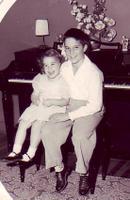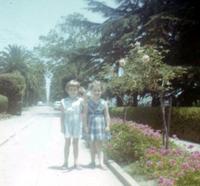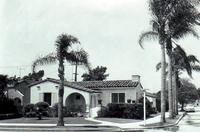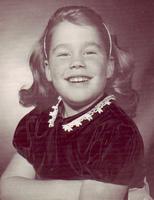 The Youngs had a set of the World Book Encyclopedia, and I would often sit in their family room and read from the encyclopedia. I loved the annual Year Books that they bought, because I could recognize some of the current stuff they talked about. Very early, I enjoyed learning for its own sake. The Youngs also had a set of the old dark red McGuffey Readers, which were organized into six volumes of increasing difficulty. They were intended as text books for the one-room schools of the prairies. Emily, the Youngs’ oldest daughter, once remarked on my being able to read from the Sixth Grade volume when I was only seven or eight years old, and that made me feel proud.
The Youngs had a set of the World Book Encyclopedia, and I would often sit in their family room and read from the encyclopedia. I loved the annual Year Books that they bought, because I could recognize some of the current stuff they talked about. Very early, I enjoyed learning for its own sake. The Youngs also had a set of the old dark red McGuffey Readers, which were organized into six volumes of increasing difficulty. They were intended as text books for the one-room schools of the prairies. Emily, the Youngs’ oldest daughter, once remarked on my being able to read from the Sixth Grade volume when I was only seven or eight years old, and that made me feel proud. Momma began working in the back workroom of the library as a cataloguer, but later was promoted to Head Librarian, and she held that position until she was sixty-five and managing five libraries all over Los Angeles. I don’t know how old I was when Momma first walked me into the depths of the Pepperdine Library. This would become my most important resource. She took me back in the stacks, way back to almost the end of all those dozens of shelves of books, and showed me the Children’s books. Since Pepperdine had an Education Department, the library offered a selection of good children’s literature for the student teachers.
Many afternoons after school, I walked down that long, dim, dusty corridor, past that sea of books, and turned right near the back. There was a window there which shed a warm and welcome light on the book titles. I wasn’t systematic at all, but over the next few years I read nearly everything in the Children’s section. I wasn’t even aware of why at the time, but I did skip the books about war, and I never read anything that was specifically for boys, like the Hardy Boys mystery series.
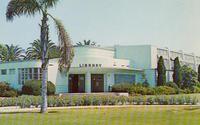
Of course I read all of the Nancy Drew series (and Trixie Belden too, although I thought that Trixie’s world was not as classy as Nancy’s), but I didn’t find Nancy Drew at Pepperdine. That series of green speckled books was in the little library at the Lockhaven Christian School where I attended later on. No, mostly at Pepperdine the books were Caldecott and Newberry Medal winners and the like.
After its exciting start, my career in the theater seemed to be immediately foiled. Pepperdine’s musical when I was in first grade was Rodgers & Hammerstein’s South Pacific and Marilyn Young’s dark beauty made her perfect for the part of Ngana, Emile DeBecque’s Polynesian daughter. But Marilyn needed coaching on her duet with her brother in the play, Jerome. They had to sing, in French no less. Picture me, six years old, coaching Marilyn in how to sing “Dites moi, pour quois, la vie e belle? “ (“Tell me why, please, life is so beautiful? “) . . .” phonetically. I had no idea what the French syllables meant at the time, but I could help Marilyn memorize them anyhow.
The next year, 1960, there was a thrilling musical on TV, Mary Martin starring in Peter Pan. Chip gave me the set of three 45 rpm records for a Christmas present, and I memorized every word, reliving every detail of the stage action that went with the songs. So now I had memorized every word and every note of three musicals, I was six years old and I was hooked on musicals and hooked on singing. And displaying a precocious ability to memorize lyrics. That particular ability has never earned me anything tangible, but it has given me a lot of pleasure throughout the years. I’ve comforted and encouraged myself with hymns and energized myself with popular music all my life.
Between first and second grade, my teacher chose me to be the child honored with the responsibility of keeping the class guppies over the summer. This was not a happy task. I had to clean their tank regularly, and in the process of removing them from the tank I know I lost one or two down the sink drain. This was extremely upsetting to me. I couldn’t verbalize it, but I wanted some grown-up to say, “This is too big a job for you, you don’t have to be responsible for these tiny little lives.” I felt terribly guilty about my inability to do the job I had been given.
In second grade, some of my memories are very clear and precise, as if I’m watching a movie of myself. I walked home from school alone, down the street from Raymond Avenue to where it dead ended at the Pepperdine campus. I think I cut through people’s yards on 78th Street. I would find myself somewhere between the Home Economics building and the girls’ dorm, and then I would walk crosswise across the campus, maybe stopping off at the library to see my mom, or at the Ad Building to see my dad.
There was a bookstore between the tennis courts next to Marilyn Hall (the girls’ dorm, named after the Pepperdines’ daughter) and the Cafeteria. I loved to wander through the bookstore and look at the office supplies. What was the attraction? I didn’t have a clue that these would become tools of my trade: pens, paper, ink, books, erasers, index cards. I just loved the feeling of having “supplies”. Maybe it was Captain Kangaroo and Mr. Green Jeans on TV in the mornings, encouraging us to make a work box with our supplies in it. Maybe it had to do with both my parents working in offices, and I wanted to use these adult things. Once I fell to the temptation of stealing something, and my conscience bothered me so much that I had to take it back and tell the manager, Gary Mitten, what I had done. I don’t recall my folks making me confess, so I doubt they ever knew I had done it.
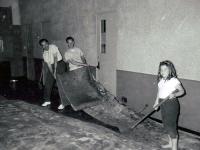
This is Daddy, Gary Mitten and me, ripping up old carpet
(probably a photo op for the campus newspaper).
As I walked home, I usually remembered to sing loudly. I really hoped that someone who might be working inside the Fine Arts Building could hear me and “discover me”. In my fantasy, they would come rushing out of the building and say, “Kid! You’re so talented! We’ve got to have you in our next play!” But that particular fantasy never came to pass. At home I would watch cartoons (Casper the Friendly Ghost and Felix the Cat and Popeye) and be alone until my parents got off work.
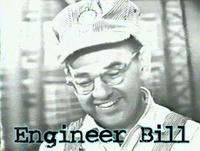 Children’s TV in Los Angeles at that time was pretty wild and varied. There was a local show with Engineer Bill, where he wore a striped conductor’s cap. One of his shticks was his drinking game with the kids. “Green light” meant drink you milk, “Red light” meant to stop. (I read on the internet that he walked off the show really angry one day during a “Red light, green light” game, and got himself canceled. As last posted on the internet, he was 90 years old and living in the San Fernando Valley.)
Children’s TV in Los Angeles at that time was pretty wild and varied. There was a local show with Engineer Bill, where he wore a striped conductor’s cap. One of his shticks was his drinking game with the kids. “Green light” meant drink you milk, “Red light” meant to stop. (I read on the internet that he walked off the show really angry one day during a “Red light, green light” game, and got himself canceled. As last posted on the internet, he was 90 years old and living in the San Fernando Valley.)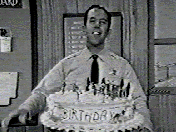 We had a guy named Sherriff John whose show I had forgotten until I saw his picture on the internet. He used to sing happy birthday to “all his little deputies out there.” (Boomers in L.A. are pretty serious about their nostalgia, it seems, trying to recapture their TV Land childhood.) I loved Miss Frances’ Ding-Dong School, and I recently found out that she had her Ph.D. and was trying to bring some educational value to her kids’ morning show. She died in 2001, but I hadn’t heard anything of her since the 1950s and ‘60s.
We had a guy named Sherriff John whose show I had forgotten until I saw his picture on the internet. He used to sing happy birthday to “all his little deputies out there.” (Boomers in L.A. are pretty serious about their nostalgia, it seems, trying to recapture their TV Land childhood.) I loved Miss Frances’ Ding-Dong School, and I recently found out that she had her Ph.D. and was trying to bring some educational value to her kids’ morning show. She died in 2001, but I hadn’t heard anything of her since the 1950s and ‘60s. 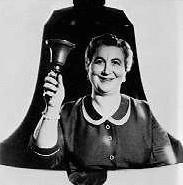
Captain Kangaroo was such a great show. He and his friend Mr. Green Jeans were so comforting to me. There was a stability and kindness and quietness that I loved about them. Soupy Sales’ slapstick was funny, but I needed this feeling that grownups were solid and dependable. He designed his show to teach kids about literature, science and music, making learning delightful. His big pockets always had surprises in them. I was listening the morning he read Make Way for Ducklings, which became a favorite children’s book of mine.
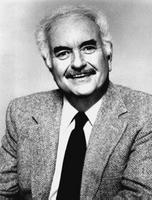 I was so excited to meet Bob Keeshan, the actor who played Capt. Kangaroo, at the airport in Nashville a few years ago. I walked up to him and said, “Mr. Keeshan, would you mind if my friend and I take your picture?” He asked me to wait until he’d finished in line, of course, and then he patiently accommodated us. He still had his bushy white mustache and those cut straight across bangs.
I was so excited to meet Bob Keeshan, the actor who played Capt. Kangaroo, at the airport in Nashville a few years ago. I walked up to him and said, “Mr. Keeshan, would you mind if my friend and I take your picture?” He asked me to wait until he’d finished in line, of course, and then he patiently accommodated us. He still had his bushy white mustache and those cut straight across bangs.Somebody’s parent got a bunch of us tiny kids onto the Bozo the Clown Show. I can still feel those bleachers under me and the bright lights and the confusion of not knowing what was going on. Apparently, the guy who played Bozo in L.A. was named Vance Colvig, whose brother, Pinto Colvig, was the original voice of Disney’s Goofy. Illustrious theatrical family, that.
Sometimes Chip was home from school, but by the time I was in first grade, he was already in seventh, and he rode to his school, Horace Mann Junior High, on his bike. He would sometimes stop off at the Dairy Queen on Normandy Avenue, two or three blocks away from our house, and get a hamburger on his ride home. Or he would stay late for band practice. He played clarinet in a jazz band and in the marching band.
Chip and I both had occasional trouble getting home from school in the big city. There was a little girl who either enjoyed being mean or didn’t like me, or maybe some of both. I recall her chasing me part of the way home with a big stick more than once. And Chip was beat up more than once by gang members while riding home on his bike.
Five Years in the Pink House
I believe I was in second grade when we moved from the yellow and white house on 80th Street to a house one block nearer to the Pepperdine campus, 1034 West 79th Street. The new house faced the campus, and across the street to the right was the back yard of our church, the Vermont Avenue Church of Christ. Much more about the church later. The house had pink wood siding, and I remember it in much greater detail than any previous home.
When you walked up to the front door, you stepped up a couple of steps and on your right was a front porch the length of the house that was enclosed by a brick walk about waist high. In addition to the brick wall, there were lots of tall trees, so the long, narrow patio felt private. It was my job to unwind the green hose from its circular pile, and wash off that porch when it got dirty or full of leaves, especially when company was coming. I loved the feeling of the cold water rushing, and the metallic smell of it, and the power I felt when I learned to hold my thumb over the nozzle and make the water into a spray. I loved washing off that porch. I loved having wet bare feet. It was a very satisfying sensual experience. I didn’t often get messy, but that was one time I could.
The lawn was not grass, but something else, very Californian. It was called dichondra, and it looked like tiny miniature plants. It was darker green than grass, held water better than grass and didn’t require much mowing. That lawn had sprinklers set into it, and I used a metal rod with prongs to turn on the sprinklers. When Daddy and I worked in the yard, he would wear these disproportionately small, red sunglasses that he’d found in some Woolworth’s 5 & 10¢ store or drugstore. As I grew older, I was mortified, imagining that the college guys would walk past and see us, and think we were the Nerd Family.
The side of the house that faced New Hampshire Avenue had huge blue-violet and white hydrangea bushes that were so tall they reached up to the roof and part of the chimney. In the front yard, in front of the brick wall on the right, and in front of the living room windows on the left, there were some amazing flowers I had never seen before.
There were calla lilies. The white flower wrapped around itself like a cone, and the petal felt like a marshmallow. In the middle was a long, rounded yellow stamen like a narrow tongue. There were several Birds of Paradise. The flowers from these plants reminded me of a beach bird’s head, with its mouth open. They were orange and purple, and I loved them in spite of their spikiness and wild look. There were fuchsias. These were magical to me because they looked like bells hanging down. They were deep bright pink and purple. The blossoms on those plants grew very lush and big.
Over on the right side of the house, there was a little area that was very secluded, like a little garden room. Mom named that area her Meditation Garden, although the only time she meditated in it was probably when she was gardening. She put down some white gravel to make tiny paths between the plants, and there were bushes and plants with large leaves that made it feel very full of cool, green life. Just in front of it, in the grass, would spring up wild violets. They would appear overnight and they felt like little fairy flowers to me, they were so small and delicate. I would lie on my stomach and look at the tiny plants and dichondra and violets and try to imagine myself their size, an inch or two tall. I could almost do it.
At the back of the Meditation Garden, on the right side of the house, was an enormous avocado tree, probably twice the height of the house. We would be sitting at the supper table and hear a “thunk” on the roof. It felt so luxurious to know that we could walk outside and pick up a ripe avocado from our own tree. The story goes that early in our California years my parents sent a box of California produce back to Nashville as a Christmas present. Our relatives, being unaccustomed to such exotic fruit, wrote in their thank you note, “It was a shame that when the box arrived, some of the contents were already rotten and we had to throw them away.” They didn’t know that those avocados were at the peak of perfection when their knobby skins turned black.
When you walked up the sidewalk to the front door of the Pink House (as we referred to it when we had moved elsewhere), inset in the door was a stained glass window which my brother still owns. It was a self-portrait of the young Albrecht Dürer sitting beneath a tree and sketching. It intrigued me, the many layered idea of someone creating a stained glass picture of the artist painting a picture of himself drawing a picture, which small sketch the viewer can also enjoy.
Inside the front door, on the left, was the living room, which we used mostly for company, and a connecting dining room where the TV stood in the corner and where we sometimes ate Sunday night suppers after church. We didn’t have many family traditions, but one we did enjoy came from my parents’ six months in Zurich in 1947. As they waited to be admitted into Germany, for a time they lived in a hotel. The Swiss hotel owners thought that these “rich Americans” would want to be fed well at each meal, but after a short while the Americans asked the restaurant staff if they could please have something lighter for supper.
“Ah,” they replied, “you prefer it our way.” And they began to bring their guests more typical fare for their late meal, which they called Abendbrot or “evening bread”. They fixed one dish which they called Birchermüesli, named after its inventor, a Dr. Bircher who was a health nut. Birchermüesli was all raw, and the ingredients were determined by what was available in the days so near the end of World War II. You took raw oatmeal, uncooked, and added canned milk to make it creamy. Then you grated an apple, added chopped nuts, and whatever fruit was available, generally a chopped banana and a small can of fruit cocktail. You might throw in a few raisins.
So this became a favorite family meal when I was young. Sunday nights after church, we would have Birchermüesli with a triangle of Swiss cheese (wrapped in foil, it came in a circular cardboard box, the individual pieces fitting like slices of a pie). There were different flavors to select from. With that we might have a slice of bread and butter. And we would sit in front of the TV together, watching Walt Disney’s Wonderful World of Color and maybe even Bonanza.
Next to the dining room there was a breakfast room, where Mom’s violets sat on the built-in cabinets beneath the windows, and next was the kitchen. I remember Chip sitting at the breakfast room table and consuming his favorite college lunch: two scrambled egg sandwiches, a quart of milk and a whole bag of Oreo cookies. How could he stay so thin? He taught me how to make perfect scrambled eggs, not too dry, not too gooey, and never brown.
There’s a story about Chip that was often told, but I think I was too young to be aware of it happening at the time it did. One morning he was discovered with all the makings for a sandwich on a table by the side of his bed. He had not actually made the sandwich, just collected everything he needed from the kitchen and brought it to his room. He had no memory of getting up in the middle of the night and doing that.
Next to the kitchen was a laundry room, where the back door was. Out the back door and a few steps down to the yard, the water softener tank was on the left, an innovation we hadn’t heard of before. Daddy tried to explain the concept of “hard water” to me and I helped him add salt to the water softener from time to time.
There against the house, the faucet dripped and my mother grew mint. The backyard contained a clothes line and Momma had a large rose bush which she tenderly cared for with sprays and powders and which grew tall, blooming past the clothesline pole. The back wall of the back yard was covered with dark ivy that might have been eight to ten feet high. In the left corner was a free-standing garage that opened onto the alley. Around the house to the right was a narrow passage that was blocked by some kind of fence. That’s where we put a cardboard playhouse for me, and later on when we got a dog, Manfred the Wonder Dog, that’s where we put his doghouse.
Back to the front door for a tour of the other side of the Pink House. First room on the right was my bedroom. I think it had brown walls – were they knotty pine? – and for sure I remember brown wooden slatted window shades. Those were kept open at night, and sometimes I would get scared when I saw the shadows of the leaves outside dancing, and lights flashing as cars turned our corner. The closet of that room passed through to my parents’ room, so my dad and I shared that closet.
My parents room was blue, and there was a small dressing room off the right corner of the bedroom and parallel with the pass-through closet. My mom would sit there and fix her hair. She had long hair with lots of gray in it, and she wore in a “French roll” all pinned up. She had a lot of jewelry (inexpensive, but I didn’t know that) in her jewelry box and I thought that she was very elegant. There was a long black lacquered table in front of the windows that stood next to their chest of drawers, and she had more African violets on that table. Behind it, the windows were covered with ivory colored full-length drapes, and those extended around to the left a little as well, next to their bed.
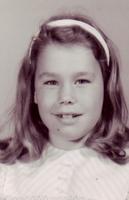
In my mom’s dressing room, when I was little, I would sit and let her comb out my hair after washing it. It grew fast, after my self-barbering, and in those days no one used cream rinse or conditioner. So I, like many other little tender headed girls, cried while Momma combed out the snarls. She was not very patient about it, and I was not very cooperative. I think I was convinced she was trying to hurt me on purpose. What a miracle it was when conditioner entered our lives!
Many evenings my dad would come home from work, have supper, and go immediately to bed. He wouldn’t go to sleep, he would just lie there in the dark and “rest”. We went to the mountains, to Big Bear Lake around this time and he sprained his ankle at the skating rink. It never really quit bothering him after that, so he would stick that left foot out from under the covers because the weight of them hurt it.
Next came the bathroom with the bathtub. (There was another, smaller bathroom off Chip’s room with a shower. This house was the first time we had two, a “girls” bathroom and a “boys” bathroom.) I vaguely remember Daddy giving me baths, but I have no idea what age I was when that ended. The room was all tiled, an ugly rose color with matching sink and tub, and burgundy tile trim. Narrow windows were on either side of the sink, but they were frosted so you couldn’t see through them.
Around the corner was Chip’s room, another blue room with two closets and windows on three sides. When he left home, we were still living in that house and I took his room. While he was there, I remember the room did not smell good. Underwear, socks, dishes he had eaten from…He paid me fifty cents to clean his room from time to time. Boys’ rooms, I guessed, were not supposed to smell good. His room connected to the small bathroom with shower, and that connected to the laundry room, which made the circle of the house complete.
It was fun, while we lived at the Pink House, to walk by myself to the grocery store. The campus was an oblong. If I walked from my house straight ahead along the short end of it, at the opposite corner would be Ralph’s Market. Mom sent me to buy milk, and when it got close to a dollar a gallon, she commented on how expensive it was becoming. I could also walk the other direction from our house, down New Hampshire and over to the left just one block to Vermont Avenue, and then I’d be out in the big world beyond the Pepperdine campus.
There were stores on Vermont, and the two I shopped in the most were J. C. Penney’s and Woolworth’s 5 & 10¢ store. (Some people called it the Five & Dime.) As Sara and Marilyn and I got older, the sales ladies started watching us to see if we were shoplifting, and we resented that. Once when we were still little there was a birthday party for one of us girls (Susan Teague? Beth Ross?). First we had a slumber party, and the next day the birthday girl’s mom took us all to Woolworth’s and gave us some money – probably a quarter or fifty cents – and let us buy whatever we liked with it. What luxury! What freedom, being trusted to make our own decisions.
Woolworth’s had a small pet section in the back and that’s where we bought our goldfish in a plastic bag of water and carried it home. I hated cleaning the goldfish bowl, when it would get all green and stinky, so my goldfish period didn’t last too long. And it was too distressing when the little turtle I bought got a soft shell and died. I had loved his little turtle dish with its island in the middle and plastic palm tree. At that point in my pet life, I decided it was either dogs for me or nothing.
There was also a bowling alley on Vermont Avenue. At some point when we were little, we heard that a man had run into the bowling alley and shot someone. That was scary. I had also heard that a dead body was found under a car on one of the streets I walked home on from Raymond Avenue school. And there was that time that one of the ladies halfway down our block shot her husband. I figured that’s how the world was. Later, when I moved to a smaller city in Tennessee, I could hardly believe that people actually left their houses and cars unlocked.
One of my recurring dreams for years was running all around our Pink House, or the Youngs’ house, trying to make sure all the doors and windows were locked, and sometimes the dream included trying so hard and not being able to get one of them locked. In the dreams, bad guys were trying to get in. Given the neighborhood we were living in, this makes lots of sense. But I realized later that the frantic attempt to make sure everything was locked had a more internal significance as well.
When the Youngs moved from the Broadway Church of Christ in Lubbock to be the President of Pepperdine, the church gave them a gift of a yellow station wagon, the kind where those who sat in the back seat were facing backward. I thought that was neat. It was fun piling into the station wagon to go somewhere, so many of us, and so much family energy. Norvel would almost always say, as we got into the car, “Isn’t this a GREAT day to be alive? Aren’t we thankful?”
I can still feel the night air and smell the popcorn from the time when we little girls lay on top of the station wagon at the drive-in movie theater and watched Disney’s Darby O’Gill and the Little People. I believed in fairies and gnomes and leprechauns for a long time after that. It was Sean Connery’s first movie, I think.
